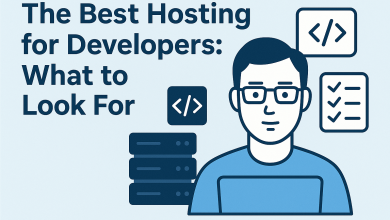Introduction
Web hosting has evolved significantly in the last decade — from slow, shared servers to blazing-fast cloud environments. As we look ahead to 2025 and beyond, the web hosting landscape is expected to undergo even more transformative changes. Whether you’re a blogger, business owner, or developer, staying informed about these trends will help you make smarter hosting decisions.
Here’s a forward-looking guide to the future of web hosting and the innovations shaping it.
1. AI-Powered Hosting: Smarter Resource Management
Artificial Intelligence (AI) is already being used for server monitoring and load balancing, but in 2025, expect more automation. AI will optimize resource allocation, predict and prevent downtimes, and even recommend hosting plans based on your website’s growth.
✅ Key Benefit: More uptime, less human intervention, and predictive performance tuning.
2. Edge Computing: Hosting Gets Closer to the User
Edge hosting is about placing your website’s data closer to where your visitors are. Rather than relying on a central server, content is delivered from edge nodes globally, significantly improving speed and reducing latency.
✅ Key Benefit: Instant content delivery, ideal for media-rich and e-commerce websites.
3. Eco-Friendly Hosting Will Be the Standard
Green hosting isn’t a trend — it’s becoming a necessity. Hosting companies are already adopting renewable energy, carbon offsetting, and energy-efficient data centers. In the future, providers may be required to meet environmental compliance benchmarks.
✅ Key Benefit: Environmentally responsible websites that appeal to eco-conscious users.
4. Serverless Hosting and Microservices
Traditional hosting models may give way to serverless environments where you pay only for the computing time you use. With microservices, different website functions (e.g., search, payments) can be hosted and scaled independently.
✅ Key Benefit: Scalability, lower costs, and no need to manage servers manually.
5. Enhanced Website Security by Default
With increasing cyber threats, future web hosting will integrate stronger security protocols by default — AI-based malware detection, proactive DDoS mitigation, and zero-trust architectures will become standard.
✅ Key Benefit: Better protection for your site and user data — without needing third-party tools.
6. Integration With Web3 and Decentralized Infrastructure
As blockchain technology matures, hosting may move toward decentralized infrastructures. This can mean better censorship resistance, increased privacy, and data ownership for users and developers.
✅ Key Benefit: Web hosting becomes more democratic and transparent.
7. One-Click Global Scaling
In the future, expect easier options for global scalability. Platforms will offer one-click scaling for traffic surges, localized content delivery, and instant deployment in multiple regions without complex configurations.
✅ Key Benefit: Global performance without technical headaches.
8. Subscription Models Will Evolve
Instead of fixed monthly pricing, expect smarter, usage-based models. Think of hosting like your mobile phone plan — you’ll pay for what you use, and unused resources may roll over or be redistributed dynamically.
✅ Key Benefit: Cost efficiency and no overpaying for unused capacity.
Conclusion: Hosting’s Future Is Fast, Smart, and Green
Web hosting in 2025 and beyond will be more than just “server space.” It’s becoming a powerful, adaptive ecosystem tailored to user experience, performance, and sustainability. Businesses and creators who embrace this shift early will be better positioned for success in an increasingly digital world.
Quick Takeaways
- AI will manage performance and uptime.
- Edge computing will supercharge speed globally.
- Green hosting will become the norm.
- Decentralization and serverless models are on the rise.
- Security will be automatic and smarter.





